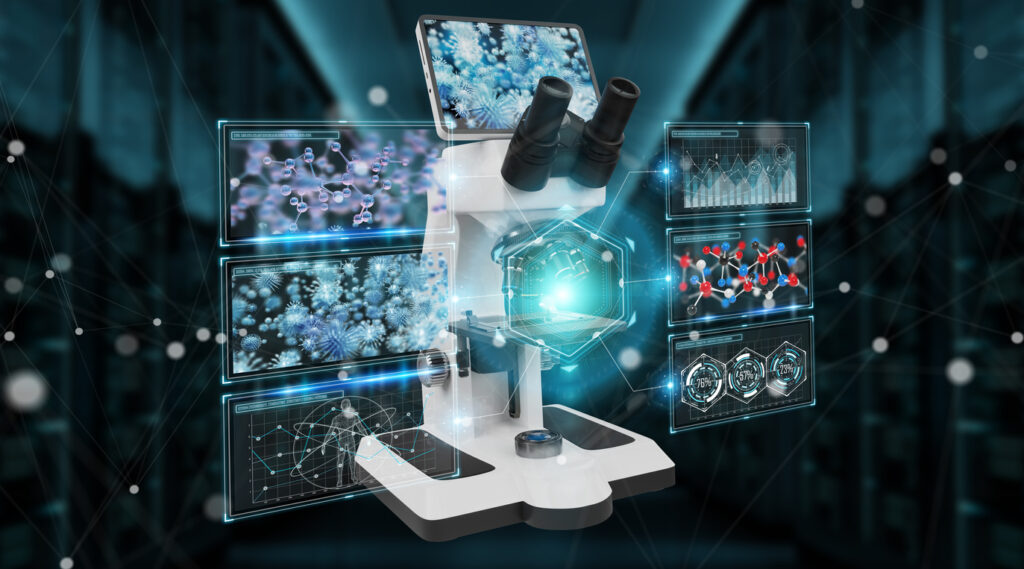In today’s rapidly advancing world of healthcare, the intersection of artificial intelligence (AI) and precision medicine has emerged as a transformative force. Precision medicine, with its focus on tailoring medical treatments to individual patients based on their unique genetic makeup, lifestyle, and environmental factors, holds immense promise for improving patient care and outcomes.
By harnessing the power of AI, healthcare technology has taken a giant leap forward, enabling sophisticated data analysis, predictive modelling, and personalised treatments.
In this article, we will delve into the various facets of AI in precision medicine, exploring its applications, benefits, and the remarkable potential it holds for reshaping the landscape of healthcare technology.
AI-Powered Diagnosis and Disease Prediction
In the realm of precision medicine, the integration of artificial intelligence (AI) has brought about transformative advancements in the accuracy, speed, and effectiveness of diagnosing diseases.
By leveraging sophisticated algorithms and advanced data analysis techniques, AI empowers healthcare professionals to make more precise and timely diagnoses, leading to improved patient outcomes.
Enhancing accuracy and speed of diagnosis:
AI algorithms excel at processing and analysing vast amounts of medical data, including patient records, genetic profiles, and diagnostic images. This capability enables AI systems to identify subtle patterns and correlations that may elude human observation.
For instance, in a study published in the journal ‘Nature Medicine’, researchers developed an AI model that outperformed human dermatologists in accurately diagnosing skin cancer. The AI system was trained using a dataset of over 130,000 images and achieved an accuracy rate of 95%, compared to 86.6% for human dermatologists. This highlights how AI can augment diagnostic capabilities and provide healthcare professionals with valuable insights for more accurate and timely diagnoses.
Predicting Diseases and Assessing Risk Factors
Another remarkable aspect of AI in precision medicine is its ability to predict diseases and assess risk factors. By analyzing large datasets containing patient information, genetic profiles, and medical records, AI algorithms can identify patterns and correlations that may indicate the likelihood of developing certain diseases.
For example, a research team from Stanford University developed an AI algorithm capable of predicting the onset of Alzheimer’s disease years before symptoms manifest. By analysing brain scans and patient data, the algorithm achieved an accuracy rate of 82% in identifying individuals who would later develop Alzheimer’s, surpassing traditional methods. This breakthrough demonstrates the potential of AI in early disease prediction, enabling proactive interventions and personalised preventive strategies.
Real-time Monitoring of Patient Health
Real-time monitoring of patient health is a critical aspect of precision medicine, and AI plays a pivotal role in this domain. With the advent of wearable devices, IoT sensors, and health monitoring platforms, AI algorithms can continuously analyse incoming data streams to monitor vital signs, detect anomalies, and provide valuable insights for healthcare professionals.
For instance, AI-powered monitoring systems can analyse heart rate variability, blood pressure, and other physiological parameters to detect early signs of cardiac abnormalities or arrhythmias. By alerting healthcare providers in real-time, immediate interventions can be initiated, potentially saving lives and improving patient outcomes.
Furthermore, AI algorithms can analyse data from multiple sources, such as electronic health records, genomic data, and patient-reported outcomes, to generate comprehensive and holistic insights into a patient’s health status. This multidimensional approach enables healthcare professionals to make more informed decisions regarding personalised treatments and interventions.

AI-Driven Drug Discovery and Development
AI-driven drug discovery involves the utilisation of computational methods and algorithms to facilitate the identification, design, and development of new drugs. By leveraging large datasets, AI algorithms can analyse vast amounts of biological and chemical data, enabling researchers to make more informed decisions and uncover promising drug candidates.
Accelerating the Drug Discovery Process
Traditional drug discovery methods are often time-consuming, expensive, and rely on trial and error. However, AI algorithms can analyse vast amounts of biological and chemical data to identify potential drug candidates more efficiently and effectively.
For example, Insilico Medicine, a biotechnology company, utilised AI to discover a novel drug candidate for idiopathic pulmonary fibrosis (IPF), a debilitating lung disease. By leveraging deep learning algorithms, Insilico Medicine screened millions of compounds and identified a molecule with potent anti-fibrotic properties. This AI-driven approach dramatically reduced the time and resources typically required in traditional drug discovery, highlighting the potential of AI in accelerating the development of new treatments.
Identifying Potential Drug Targets
AI has also played a crucial role in identifying potential drug targets, which are specific molecules or cellular processes involved in disease pathways. By analysing large-scale biological and genomic data, AI algorithms can identify previously unknown targets for therapeutic intervention.
One notable example is the use of AI in cancer research. The Cancer Genome Atlas (TCGA) project, in collaboration with AI experts, analysed genomic and molecular data from thousands of cancer patients to identify specific genetic alterations associated with various cancer types. This approach led to the discovery of novel drug targets, such as specific mutations or over-expressed proteins, which can be targeted by precision therapies. By uncovering these targets, AI facilitates the development of more precise and effective treatments tailored to individual patients.
Optimising Drug Efficacy and Safety
AI-driven technologies also optimise drug efficacy and safety by analysing vast amounts of data and predicting the outcomes of drug treatments. By considering factors such as patient genetics, disease characteristics, and treatment response data, AI algorithms can personalise treatment regimens to maximise efficacy while minimising side effects.
For instance, a study published in Nature Communications demonstrated the use of AI algorithms to predict drug-induced cardiac toxicity, a significant concern in drug development. By analysing molecular structures and clinical data, the AI system accurately predicted cardiac toxicity with an accuracy rate of over 90%, outperforming traditional methods. This capability allows pharmaceutical researchers to identify potential safety concerns early in the drug development process, reducing the risk of adverse reactions in patients.
AI-Enabled Treatment Personalisation
AI-enabled treatment personalisation has the potential to revolutionise the way that healthcare is delivered. By providing patients with the right treatment at the right time, AI can help to improve patient outcomes and reduce the cost of healthcare.
Here are some of the benefits of AI-enabled treatment personalisation:
Tailoring Treatments Based on Individual Characteristics
AI algorithms can analyse vast amounts of patient data, including genomic information, medical history, and treatment outcomes, to identify personalised treatment options that are most likely to be effective for each individual.
For example, in the field of oncology, AI algorithms can analyse genomic data from cancer patients to identify specific genetic mutations or biomarkers that can inform targeted therapies. This enables healthcare professionals to prescribe treatments that directly address the molecular drivers of the disease, increasing the likelihood of successful outcomes while minimising unnecessary side effects.
Predicting Treatment Outcomes with AI Algorithms
AI algorithms play a crucial role in predicting treatment outcomes by analysing complex datasets and uncovering patterns that may influence patient responses to specific therapies. By integrating data from diverse sources, including clinical trials, electronic health records, and patient-reported outcomes, AI can identify factors that contribute to treatment success or failure.
For instance, researchers have developed AI models that can predict the effectiveness of antidepressant medications for individual patients. By considering various factors such as genetic variations, demographics, and previous treatment history, these models can provide insights into which antidepressant is most likely to yield positive outcomes for a specific patient. This helps healthcare providers make informed decisions when selecting treatment options, increasing the chances of successful treatment and minimising trial and error.
Adapting Therapies to Patient Responses
AI enables the adaptation of therapies based on patient responses, ensuring that treatments remain effective throughout care. By continuously analysing patient data and monitoring treatment outcomes, AI algorithms can detect changes in patient conditions, identify potential adverse events, and suggest adjustments to therapy.
For instance, AI-powered monitoring systems can track vital signs, biomarkers, and patient-reported data in real time. If an unexpected deviation from the expected treatment response is detected, the system can alert healthcare professionals, enabling timely interventions and adjustments to the treatment plan.
Furthermore, AI algorithms can analyse data from multiple patients to identify trends and patterns that may inform treatment modifications. By leveraging this collective knowledge, healthcare providers can optimise therapies, adapt dosages, or switch medications, ensuring that treatments are tailored to each patient’s evolving needs.

AI and Genomic Medicine
AI and Genomic Medicine have emerged as a dynamic duo, revolutionising the landscape of healthcare with their synergistic potential to unlock the secrets hidden within our genes.
Here are some of the benefits of AI in genomic medicine:
Analysing Vast Genomic Data Sets
Artificial intelligence (AI) is revolutionising genomic medicine by enabling the analysis of vast amounts of genomic data. With the advancement of next-generation sequencing technologies, the amount of genomic data generated is increasing exponentially. AI algorithms can process and analyse these data sets at a scale and speed that would be impossible for humans alone.
For instance, the Human Genome Project, which aimed to sequence the entire human genome, generated approximately 200 terabytes of data. AI algorithms can efficiently analyse these massive data sets, identifying patterns, genetic variations, and potential disease-associated markers. This analysis provides valuable insights into the genetic basis of diseases, allowing for more targeted and personalised treatments.
Unravelling Genetic Variants and Their Implications
AI in genomic medicine plays a crucial role in unravelling genetic variants and their implications. Through data analysis and machine learning techniques, AI algorithms can identify genetic variations that contribute to the development and progression of diseases.
One example is the application of AI in cancer genomics. By analysing genomic data from tumour samples, AI algorithms can identify specific genetic mutations that drive cancer growth. This knowledge enables oncologists to select targeted therapies that directly address the underlying genetic abnormalities, leading to more effective treatments and improved patient outcomes.
Furthermore, AI algorithms can predict the functional impact of genetic variants by comparing them to vast databases of known genetic information. This capability aids in understanding the potential consequences of specific genetic variations, allowing healthcare professionals to make informed decisions regarding treatment options and patient care.
Facilitating Precision Treatments Based on Genetic Profiles
AI in genomic medicine plays a crucial role in facilitating precision treatments based on individual genetic profiles. By analysing an individual’s genetic makeup, AI algorithms can provide insights into potential treatment options that are most likely to be effective and have the least adverse effects.
For example, pharmacogenomics, a field that explores the relationship between an individual’s genetic makeup and their response to drugs, can be enhanced by AI algorithms. By analysing genomic data, AI algorithms can identify genetic markers that predict drug response or susceptibility to adverse reactions.
This information allows healthcare providers to tailor treatments to each patient, selecting medications and dosages that are optimised for their genetic profiles. This precision approach minimises trial and error, reducing the risk of adverse events and improving patient outcomes.
Ethical Considerations and Challenges
As artificial intelligence (AI) becomes more sophisticated, it is important to consider the ethical implications of its use. AI systems can be used to make decisions that have a significant impact on people’s lives, and it is important to ensure that these decisions are made in a fair and ethical way.
Some of the ethical considerations that need to be addressed include:
Privacy and Security Concerns in AI-Driven Healthcare
The integration of artificial intelligence (AI) in precision medicine brings forth significant ethical considerations, particularly in terms of privacy and security. AI algorithms rely on vast amounts of patient data, including medical records, genetic profiles, and real-time health monitoring. While this data is essential for improving patient care, it also raises concerns about the privacy and security of sensitive personal information.
It is crucial to ensure that robust data protection measures are in place to safeguard patient privacy. Healthcare organisations must implement strict protocols for data anonymisation, encryption, and access controls. Additionally, adherence to regulatory standards, such as HIPAA (Health Insurance Portability and Accountability Act) in the United States, ensures the protection of patient data and mitigates potential breaches.
Ensuring Fairness and Transparency in Algorithms
AI algorithms used in healthcare must be designed and implemented with fairness and transparency in mind. Biases can inadvertently be introduced into algorithms due to imbalanced training data or inherent biases in the data sources. These biases can lead to disparities in healthcare delivery, treatment recommendations, and outcomes, perpetuating healthcare inequalities.
To address this challenge, it is crucial to continuously evaluate and validate AI algorithms to ensure fairness and mitigate biases. Transparency in algorithmic decision-making is essential, enabling healthcare providers and patients to understand how AI systems arrive at specific recommendations or decisions. By promoting transparency and addressing biases, AI applications can contribute to equitable and unbiased patient care.
Overcoming Technical and Regulatory Hurdles
The widespread implementation of AI in healthcare faces technical and regulatory hurdles that need to be addressed. Technically, AI algorithms must undergo rigorous validation and testing to ensure their accuracy, reliability, and safety. This process requires collaboration between healthcare professionals, data scientists, and regulatory bodies to establish robust standards and guidelines.
Regulatory frameworks must also evolve to keep pace with the rapid advancements in AI-driven healthcare. The existing regulatory landscape needs to adapt to accommodate AI applications while ensuring patient safety and ethical standards. Regulatory bodies, such as the FDA (Food and Drug Administration), are actively working to provide clear guidelines for the development and deployment of AI systems in healthcare.
Moreover, interdisciplinary collaboration between healthcare professionals, data scientists, ethicists, and policymakers is essential to address the ethical considerations surrounding AI-driven healthcare. Ethical frameworks and guidelines should be developed to ensure the responsible use of AI, promote patient autonomy, and address potential societal implications.

The Future of AI in Precision Medicine
The future of AI in precision medicine holds tremendous promise, with advancements on the horizon that will further revolutionize healthcare. One area of ongoing development is the improvement and refinement of AI algorithms and models. As technology continues to evolve, AI algorithms will become more sophisticated, capable of analyzing complex data sets and generating more accurate and meaningful insights.
Advancements on the Horizon
Advancements in healthcare technology, such as wearable devices and remote monitoring systems, will provide a wealth of real-time data that can be leveraged by AI algorithms. This data, combined with AI capabilities, will enable more comprehensive and continuous monitoring of patient health, allowing for earlier detection and intervention.
Furthermore, the integration of AI with other emerging technologies, such as blockchain and the Internet of Things (IoT), holds the potential to enhance data security, interoperability, and data sharing among healthcare stakeholders. These advancements will pave the way for more seamless and efficient healthcare delivery, driving the adoption of AI in precision medicine even further.
Potential Impact on Patient Outcomes
The potential impact of AI in precision medicine on patient outcomes is immense. With AI algorithms analyzing vast amounts of patient data, including genetic profiles, clinical records, and lifestyle information, personalized treatments can be tailored to an unprecedented level. This individualized approach has the potential to significantly improve treatment efficacy and patient outcomes.
For instance, AI algorithms can help identify the most suitable treatment options based on a patient’s genetic makeup and disease characteristics. By analyzing data from similar patient cases, AI can provide insights into the potential outcomes of different treatment strategies, allowing healthcare providers to make more informed decisions.
Moreover, AI-powered predictive models can help identify individuals at high risk for certain diseases, enabling early interventions and preventive measures. By harnessing the power of data analysis and machine learning, AI can contribute to the early detection of diseases, leading to timely treatments and improved prognosis.
Collaboration between AI and Healthcare Professionals
The future of AI in precision medicine relies on strong collaboration between AI systems and healthcare professionals. While AI algorithms can analyse vast amounts of data and generate insights, human expertise, and clinical judgment are crucial for interpreting and implementing these findings.
Healthcare professionals play a pivotal role in providing the necessary context, validating AI-generated insights, and making informed decisions about patient care. Collaboration between AI systems and healthcare professionals can result in a synergy that combines the strengths of both, leading to enhanced precision in diagnosis, treatment selection, and patient management.
To foster this collaboration, ongoing education and training programs are necessary to equip healthcare professionals with the knowledge and skills to effectively utilize AI in their practice. Interdisciplinary collaborations between data scientists, AI experts, and healthcare professionals can drive innovation and ensure that AI technologies align with the specific needs and ethical considerations of precision medicine.
Conclusion
AI in precision medicine holds tremendous promise for revolutionizing healthcare and improving patient care. By embracing the potential of AI applications, healthcare professionals can unlock new opportunities for diagnosis, treatment, and personalized care. As we navigate the future, it is imperative to embrace collaboration, address ethical considerations, and adapt to evolving technologies, ensuring that AI in precision medicine continues to drive medical advancements and provide optimal patient care.
Found this article interesting?
P.S. Here are 5 ways we can help you accelerate your Pharma AI results:
1. Follow Dr Andrée Bates LinkedIn Profile Now
Revolutionize your team’s AI solution vendor choice process and unlock unparalleled efficiency and save millions on poor AI vendor choices that are not meeting your needs! Stop wasting precious time sifting through countless vendors and gain instant access to a curated list of top-tier companies, expertly vetted by leading pharma AI experts.
Every year, we rigorously interview thousands of AI companies that tackle pharma challenges head-on. Our comprehensive evaluations cover whether the solution delivers what is needed, their client results, their AI sophistication, cost-benefit ratio, demos, and more. We provide an exclusive, dynamic database, updated weekly, brimming with the best AI vendors for every business unit and challenge. Plus, our cutting-edge AI technology makes searching it by business unit, challenge, vendors or demo videos and information a breeze.
- Discover vendors delivering out-of-the-box AI solutions tailored to your needs.
- Identify the best of the best effortlessly.
- Anticipate results with confidence.
Transform your AI strategy with our expertly curated vendors that walk the talk, and stay ahead in the fast-paced world of pharma AI!
Get on the wait list to access this today. Click here.
4. Take our FREE AI for Pharma Assessment
This assessment will score your current leveraging of AI against industry best practice benchmarks, and you’ll receive a report outlining what 4 key areas you can improve on to be successful in transforming your organization or business unit.
Plus receive a free link to our webinar ‘AI in Pharma: Don’t be Left Behind’. Link to assessment here
5. Learn more about AI in Pharma in your own time
We have created an in-depth on-demand training about AI specifically for pharma that translate it into easy understanding of AI and how to apply it in all the different pharma business units — Click here to find out more.

